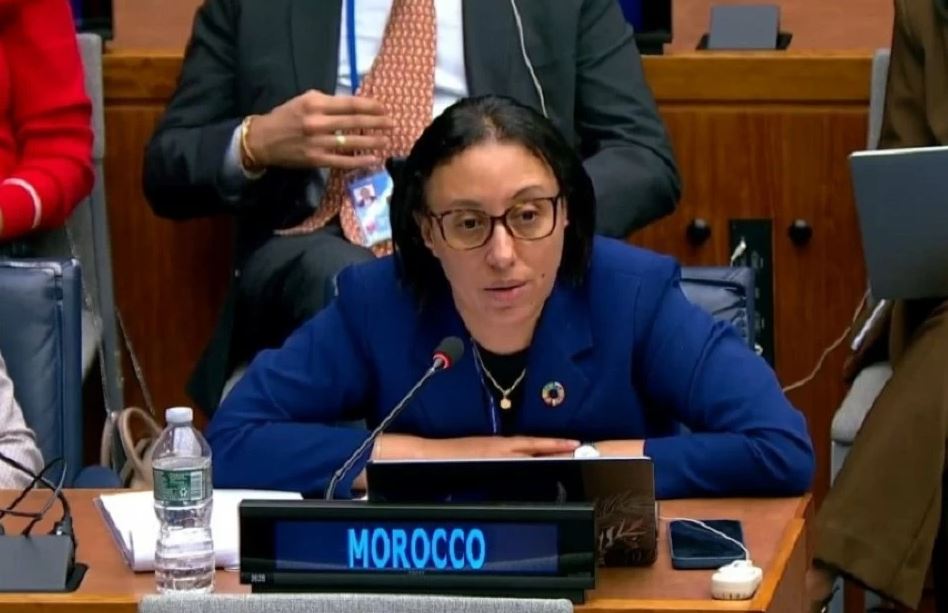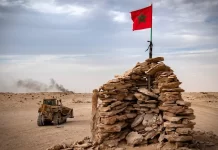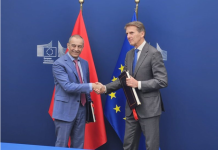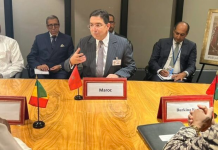We wonder why the Algerian delegation, demonstrating obvious double standards, focuses solely on MINURSO while turning a blind eye to other peacekeeping operations,” questioned Morocco’s representative.
Doha – Morocco’s Deputy Permanent Representative to the UN launched a scathing critique against Algeria’s position on MINURSO’s mandate during a UN Security Council debate, denouncing what she called “flagrant and selective double standards” in the Algerian approach to human rights monitoring.
“It reflects a masterclass in selective political manipulation,” Majda Moutchou charged, responding to the Algerian ambassador’s intervention regarding human rights monitoring in MINURSO’s mandate.
She accused Algeria of “suddenly discovering a new passion for human rights and international law.”
“The mandate has been clearly defined by the Security Council, and any attempt by the Algerian delegation to distort its role is either misinformed or deliberately misleading,” Moutchou asserted, emphasizing MINURSO’s clear mandate to supervise the ceasefire.
Moutchou dismantled the Algerian position by pointing out that seven out of eleven UN peacekeeping operations lack human rights monitoring mandates.
“We wonder why the Algerian delegation, demonstrating obvious double standards, focuses solely on MINURSO while turning a blind eye to other peacekeeping operations,” she declared.
The Moroccan diplomat revealed that the Security Council had “categorically rejected” proposals to include a human rights monitoring mechanism in MINURSO’s mandate in October 2024.
“This rejection wasn’t accidental: it reaffirmed that the human rights situation in the Moroccan Sahara doesn’t require such a mechanism,” she stated.
Turning the tables on Algeria, Moutchou demanded answers about “a far more pressing issue: the Tindouf camps on Algerian territory, where the population lives under daily oppression, deprived of fundamental rights and subjected to severe movement restrictions and flagrant violations of international law.”
“The UN must pay attention to all these aspirations, without exception or selectivity, including on the territory of states that advocate self-determination for others while systematically denying it to oppressed peoples on their own territory,” she charged.
The diplomat exposed what she termed a “troubling contradiction” in Algeria’s stance on self-determination, arguing that Algeria wielded it “as a political weapon against Morocco’s territorial integrity” while ignoring “legitimate aspirations of other peoples still living under foreign occupation and oppression.”
“The Sahara has always been an integral part of Morocco,” Moutchou concluded, describing this as a reflection of “centuries of historical, cultural and geographical links” rather than a recent claim.
The heated exchange occurred during a public debate on strengthening UN peacekeeping operations’ adaptability, where Morocco’s representative systematically countered Algeria’s attempts to modify MINURSO’s established mandate.
This diplomatic clash comes as Morocco continues to gather international support for its position.
In a meeting yesterday with UN Envoy Staffan de Mistura in Rabat, Foreign Minister Nasser Bourita reiterated Morocco’s commitment to a political solution based exclusively on the Autonomy Plan, while respecting the country’s sovereignty and territorial integrity.
Meanwhile, the American Enterprise Institute has criticized MINURSO’s ongoing mission, with scholar Michael Rubin pointing out in a recent commentary that “Thirty-four years and billions of dollars later, MINURSO has not even conducted a census.”
Rubin further charged that the separatist Polisario Front “holds wives and children as hostages to prevent refugee resettlement” in the Tindouf camps.
BY: The Times Union







